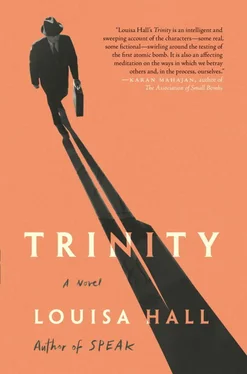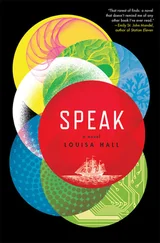In Austin, as the days became shorter, evening arrived with outrageous force. At that time of day, I pushed my son in his stroller down the side streets in our neighborhood, toward the state hospital on Guadalupe. On our way home, for those few minutes before the last light was sucked from the sky, I was almost always overcome with that nameless dread that was growing within me. Then the blank sky over the roads was streaked with alarming new color, electric tangerine and neon pink, the sun’s last, desperate light caught and magnified by the low clouds, and the telephone wires that lined Guadalupe were beaded with innumerable grackles, hunched shoulder to shoulder along the sagging lengths of the wires, as if strung together on the necklace of some demented boy chief.
Occasionally, warned by a shriek I couldn’t detect, they lifted all on one wing and waved against the sky like a black flag at the head of an army. Then, just as suddenly, they landed again, and the crazed color drained out of the sky, and in the new darkness the dried husks of pecan leaves scuttled nervously off down the sidewalks.
SOMETIMES, IN SUCH A DIRE ATMOSPHERE, I WISHED FOR MY HUSBANDto come home and protect us.
Other times I was more realistic. What could he do, with his little pistol, his mere pocketknife, to ward off that bloody sky, or the waving black flags of the grackles?
Nothing. In my more realistic moments, I knew that. In the end, I didn’t attribute to him the power to protect me against the forces of destruction that hovered around me that winter. I only attributed to him the power to kill me.
And perhaps, in the end, that was the only power he’d ever had, and the only power I’d ever relied on. With his knife and the gun that he’d bought and the way he’d grabbed my neck and shaken it roughly, he’d advertised himself as a man who possessed the power to end a life swiftly.
And yet even that, I realized, had been a mere feint. Because rather than putting me out of my suffering swiftly, he’d simply walked out. He couldn’t even stand to see me feel sorrow. In the end, he left me wounded on that couch, and though he might have easily bludgeoned me to death with the buckle of that ridiculous belt, he didn’t even have the courage to kill me.
He was not, I realized, like a man who takes his old dog out to the woods in order to shoot it.
He was a man who takes his old dog out to the woods, then can’t summon the will. Though he knows the dog is in pain, he can’t kill it. He doesn’t want the blood on his hands. He’s too afraid of the guilt he’ll feel after.
So instead, he leaves the old dog to suffer in agony through a cold season, dying alone in the forest, blood seeping into the fallen pecan leaves, still lifting its muzzle at any stray sound, imagining with a surge of joy that will soon plunge in the other direction that the sound might signal the approach of its master, the one man who could come and explain the sudden change in the dog’s situation, or who, if he can’t explain it, if he can’t find the right words, will at least have the decency to simply and regrettably kill it.
THESE, OF COURSE, ARE HYSTERICAL THOUGHTS. I KNEW IT, EVENback then. I realized that it was essential for me to stop thinking in such an uncontrolled way.
Such hysterical thoughts, as I well understood, are unforgivable thoughts in a mother. I had a child to look after. I had no right to drive myself insane for no reason. Diligently, therefore, every day, I reminded myself of the pertinent facts. Your husband only had an affair, I told myself. Many people have affairs at some point.
Who cares if he lied, I said to myself. Who cares if he left you. You’re still alive, you have a son, you have a floundering career to restart.
IN MY EFFORT TO CEASE FEELING SUCH UNTOWARD EMOTIONS, I REDOUBLEDmy efforts to understand the situation correctly. I could see no other way out than to understand the person who had caused the situation to start with.
By then, however, I no longer had the subject at hand. I couldn’t question him further.
Then it seemed to me that my major mistake had been to allow my subject to escape before I’d finished the portrait. I should have managed to keep him, I thought, at least until I’d written the ending. Then I rebuked myself for all the insufferable questions I’d asked. I chastised myself for conducting those endless interrogations.
At night, trying to fall asleep while the branches of the loquat clicked their fingernails on the window, I accused myself of having presided over a brutal inquisition. I’d set up, I realized, a McCarthyan trial, adjudicating my husband’s personal life. Ever since that woman called, I’d approached my husband like a prosecutor with no sense of restraint, prying into his most intimate secrets.
Standing above him and his flaws, I’d been like a cruel judge, condemning him with no sense of restraint.
Then, abhorring myself for that role in the trial, I’d find myself switching sides.
Your Honor, I often said to myself, while walking our son to day care, and arguing like a lawyer for the defense: it was only one little betrayal.
It was a little betrayal, I said to myself, that was, in the end, only a test of your capacity to understand and forgive.
It was a test of your ability to be a fair judge, to see a man’s nature wholly—complicated and fallen, as all our natures are—and embrace it despite its slight imperfections.
THEN, ON MY WAY HOME FROM DAY CARE, THOUGH I’D ONCE BEENthe judge, I now found that it was I who was on trial for the crime of failing to love a man despite his imperfections.
By leaving our house, therefore, my husband hadn’t punished himself, he’d punished me, and rightly, for imagining I loved him as a woman should love her husband, when in fact I was only capable of a puritanical, trite kind of judicious affection: the prudish love of a woman who won’t watch violent movies, or tolerate curse words, or keep her eyes open while fucking.
ONE MORNING, IN THE SECOND WEEK OF NOVEMBER—THE MORNINGbefore I received the call from my editor to give me the Oppenheimer assignment—I was on my way out of the grocery store, holding a bag on one hip and my son on the other, when I was stung by a bee.
It came out of nowhere. I hadn’t been stung by a bee since I was a child in Princeton. Now it seemed almost funny, an absurd little slight, that in the face of everything else that had happened in the last year, some quixotic bee should think to attack me.
Swiftly, decisively, I brushed the bee off my hand. I buckled my son in his car seat. I loaded the groceries into the trunk. And only then did I notice that the bee was writhing in agony on the concrete.
I stood over it, looking down from above.
I realized that I must have brushed it off with more force than I’d thought. It was moving in circles, dragging one of its wings.
I watched it writhe for a while, wondering whether or not I should kill it. The sting on my hand had started to hurt, but that wasn’t what bothered me most. What bothered me was watching its little performance. Standing there, looking down from above, and watching its flamboyant, useless suffering, and feeling within myself a surge of guilt for my part in its demise, which was a much more uncomfortable sensation than hurt or even anger.
I’d have preferred, in that moment, to feel anger at the fact that it stung me, or hurt at having been stung, rather than guilt for my part in its pain.
But there it was, dragging its wing, moving in circles, aware perhaps that it had acted stupidly, that it had stung a woman who had no intention of bringing it harm, and that in its absurd act of aggression it had caused me—taken by surprise as I was—to retaliate with equally ludicrous force.
Читать дальше












